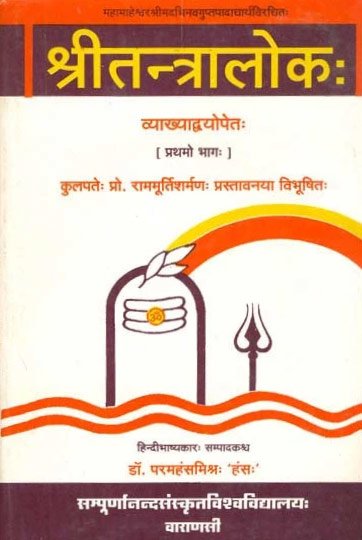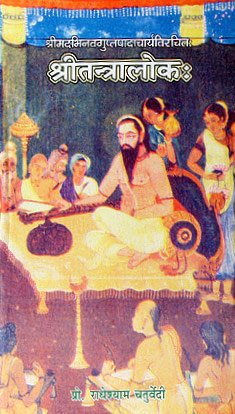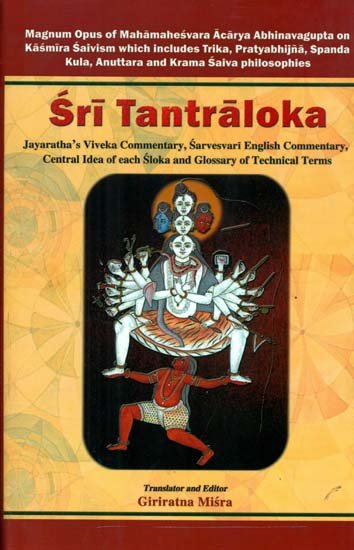Tantraloka [sanskrit text]
by Jun Takashima | 2020 | 46,255 words
The Sanskrit text of the Tantraloka of Abhinavagupta including grammatical analysis, English glossary and comparative print editions. The Tantraloka (“light on Tantra”) was written by Abhinavagupta in the 10th century in Kashmir and represents a major Encyclopedic work in Shaivism dealing with many core aspects and terminology.
Verse 2.49
गुरोर्वाक्याद्युक्तिप्रचयरचनोन्मार्जनवशात् समाश्वासाच्छास्त्रं प्रति समुदिताद्वापि कथितात् ।
विलीने शंकाभ्रे त्दृदयगगनोद्भासिमहसः प्रभोः सूर्यस्येव स्पृशत चरणान्ध्वान्तजयिनः ॥ ४९ ॥
gurorvākyādyuktipracayaracanonmārjanavaśāt samāśvāsācchāstraṃ prati samuditādvāpi kathitāt |
vilīne śaṃkābhre tdṛdayagaganodbhāsimahasaḥ prabhoḥ sūryasyeva spṛśata caraṇāndhvāntajayinaḥ || 49 ||
The English translation of Tantraloka Verse 2.49 is contained in the book Sri Tantraloka by Satya Prakash Singh & Swami Maheshvarananda. This book is not available online so in order to read the full text and translation you should buy the book:
Buy now! English translation by Satya Prakash Singh & Swami Maheshvarananda (2015)
Glossary of Sanskrit terms
Note: This extracts Sanskrit terms and links to English definitions from the glossary, based on an experimental segmentation of verse (2.49). Some terms could be superfluous while some might not be mentioned. Click on the word to show English definitions.
Guru, Vakya, Pracaya, Racana, Unmarjana, Vasha, Samashvasa, Shastra, Prati, Samudita, Vapi, Vapin, Kathita, Vilina, Shanka, Abhra, Abhri, Prabhu, Surya, Iva, Carana, Dhvanta, Jayin, Jayi,
Analysis of Sanskrit grammar
Note: this is an experimental feature and only shows the first possible analysis of the Sanskrit text (Tantraloka Verse 2.49). If the system was successful in segmenting the sentence, you will see of which words it is made up of, generally consisting of Nouns, Pronouns, Verbs, Participles and Indeclinables. Click on the link to show all possible derivations of the word.
- Line 1: “gurorvākyādyuktipracayaracanonmārjanavaśāt samāśvāsācchāstraṃ prati samuditādvāpi kathitāt ”
- guror -
-
guru (noun, masculine)[ablative single], [genitive single]
- vākyād -
-
vākya (noun, neuter)[adverb], [ablative single]√vac -> vākya (participle, masculine)[ablative single from √vac class 2 verb], [ablative single from √vac class 3 verb]√vac -> vākya (participle, neuter)[ablative single from √vac class 2 verb], [ablative single from √vac class 3 verb]√vak -> vākya (participle, masculine)[ablative single from √vak class 1 verb]√vak -> vākya (participle, neuter)[ablative single from √vak class 1 verb]
- yukti -
-
yukti (noun, feminine)[compound], [adverb]
- pracaya -
-
pracaya (noun, masculine)[compound], [vocative single]
- racano -
-
racana (noun, neuter)[compound], [vocative single]racanā (noun, feminine)[nominative single]
- unmārjana -
-
unmārjana (noun, masculine)[compound], [vocative single]unmārjana (noun, neuter)[compound], [vocative single]
- vaśāt -
-
vaśa (noun, masculine)[adverb], [ablative single]vaśa (noun, neuter)[adverb], [ablative single]
- samāśvāsācch -
-
samāśvāsa (noun, masculine)[adverb], [ablative single]
- śāstram -
-
śāstra (noun, neuter)[adverb], [nominative single], [accusative single]
- prati -
-
prati (indeclinable adverb)[indeclinable adverb]prati (noun, masculine)[compound], [adverb]pratī (noun, masculine)[adverb], [vocative single]pratī (noun, feminine)[compound], [adverb], [vocative single]pratī (noun, neuter)[compound], [adverb], [nominative single], [vocative single], [accusative single]
- samuditād -
-
samudita (noun, masculine)[adverb], [ablative single]samudita (noun, neuter)[adverb], [ablative single]
- vāpi -
-
vāpi (noun, feminine)[compound], [adverb]vāpī (noun, feminine)[adverb], [vocative single]vāpin (noun, masculine)[compound], [adverb]vāpin (noun, neuter)[compound], [adverb], [nominative single], [vocative single], [accusative single]
- kathitāt -
-
kathita (noun, masculine)[adverb], [ablative single]kathita (noun, neuter)[adverb], [ablative single]√kath -> kathita (participle, masculine)[ablative single from √kath class 10 verb]√kath -> kathita (participle, neuter)[ablative single from √kath class 10 verb]
- Line 2: “vilīne śaṃkābhre tdṛdayagaganodbhāsimahasaḥ prabhoḥ sūryasyeva spṛśata caraṇāndhvāntajayinaḥ ”
- vilīne -
-
vilīna (noun, masculine)[locative single]vilīna (noun, neuter)[nominative dual], [vocative dual], [accusative dual], [locative single]vilīnā (noun, feminine)[nominative dual], [vocative single], [vocative dual], [accusative dual]
- śaṅkā -
-
śaṅka (noun, masculine)[compound], [vocative single]śaṅkā (noun, feminine)[nominative single]
- abhre -
-
abhra (noun, neuter)[nominative dual], [vocative dual], [accusative dual], [locative single]abhri (noun, feminine)[vocative single]√abhr (verb class 1)[present middle first single]
- Cannot analyse tdṛdayagaganodbhāsimahasaḥ*pr
- prabhoḥ -
-
prabhu (noun, masculine)[ablative single], [genitive single]prabhu (noun, feminine)[ablative single], [genitive single]
- sūryasye -
-
sūrya (noun, masculine)[genitive single]sūrya (noun, neuter)[genitive single]√sūr -> sūrya (participle, masculine)[genitive single from √sūr class 4 verb], [genitive single from √sūr class 10 verb]√sūr -> sūrya (participle, neuter)[genitive single from √sūr class 4 verb], [genitive single from √sūr class 10 verb]
- iva -
-
iva (indeclinable adverb)[indeclinable adverb]iva (indeclinable)[indeclinable]
- spṛśata -
-
√spṛś (verb class 6)[imperative active second plural]
- caraṇān -
-
caraṇa (noun, masculine)[accusative plural]
- dhvānta -
-
dhvānta (noun, masculine)[compound], [vocative single]dhvānta (noun, neuter)[compound], [vocative single]
- jayinaḥ -
-
jayin (noun, masculine)[nominative plural], [vocative plural], [accusative plural], [ablative single], [genitive single]jayin (noun, neuter)[ablative single], [genitive single]jayī (noun, neuter)[ablative single], [genitive single]
Other editions:
Also see the following editions of the Sanskrit text or (alternative) English translations of the Tantraloka Verse 2.49
Sri Tantraloka (Set of 8 Volumes)
by Paramahansa Mishra (2000)
[श्री तन्त्रालोकः (संस्कृत एवं हिंदी अनुवाद)] Sanskrit Text with Hindi Translation; Published by Sampurnanand Sanskrit University; With two commentaries: Viveka (विवेक) by Ācārya Śrī Jayaratha and Nīrakṣīraviveka (नीरक्षीरविवेक) by Paramhans Mishra.
Buy now!
Tantraloka of Abhinavagupta (with Jnanavati Hindi commentary)
by Radheshyam Chaturvedi (2002)
[आचार्य अभिनवगुप्त द्वारा रचित तंत्रलोक: संस्कृत एवम् हिन्दी अनुवाद (पाँच खंडों में)] Sanskrit Text with Hindi Translation and Commentary; Published by Chaukhambha Vidya Bhawan.
Buy now!
Sri Tantraloka of Abhinavagupta
by Giriratna Misra (2018)
With Viveka Saṃskṛta Commentary by Rājānaka Jayaratha; Sanskrit Text, Transliteration, Sarveshwari English commentary; With Glossary and Central Idea of Each Śloka; Published by Chaukhamba Surbharati Prakashan
Buy now!![Tantraloka [sanskrit text] - book cover](/uploads/a/Tantraloka-Sanskrit.jpg)


